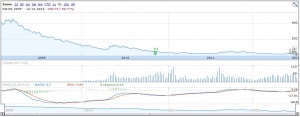I see it more often than not, traders thinking they can make a quick buck with the VXX. This usually this turns out miserable for a vast majority of those in the trade, at least in the recent months. You can call it what you like, fighting the trend, trying to outsmart the market, whatever you call it, it looks like a mistake. Maybe my opinion is slighted from my unsuccessful trade in the VXX at the beginning of the year. Though, one cannot sit by on the sideline and not witness the massacre to those who believed in the VXX story. Volatility will come back in due time, it always does, but the VXX will likely take a grimmer route.
We as a memeber of the new trading community (one tainted by the market actions of 2008 and drop off last year) believe that we can call the next disaster, that we can pick the next collapse. This has slighted many of our opinions, we saw the money made in volatility from those who timed the trade correct. I know I did, I saw those that made a killing off of the VXX, doubling their money in a month period and I wanted in. I thought at the beginning of the year, that would be me, I would make a killing on volatility. seven plus months have past since then and the VXX has done nothing but decrease in value. Oh yeah, and that collapse, it still hasn’t happened either. Everyone thinks they can outsmart the market for the next drop. The VXX seemed like the weapon of choice to take on the market that I saw as bearish. Maybe the market was very bullish and I was wrong, maybe the VXX is headed towards zero, either way, the VXX was far from a beneficial tool to my portfolio.
The VXX ETF continually loses value on a monthly basis. Ask those who have used it as a hedge for an extended period and they will tell you it is a losing proposition. I at no point claim to understand the inner workings of the volatility ETF and that is why I should never have put money to work there. Hindsight always lends itself to be 20/20. Luckily, I walked away from the VXX a long time ago, saving some of my position. Since that time, I have seen the VXX sink lower and lower, and am glad I walked when I did. Take a look at that graph and you will see, time and time agian, it has melted lower since its inception.
My ramblings suggest two basic principles. First off, predicting the next collapse is merely a fools errand. If you pick quality companies that will do better in the near future and the future not so near, your portfolio will be rewarded. Making foolish bets has netted nothing but foolish results, ask around. Secondly, know what you are trading. If you do not understand the inner working of an ETF, such as the VXX (at this point I don’t even think Barclays understands it), don’t buy it. I am still waiting on my check from Barclays with an apology note saying, “sorry we created an ETF that doesn’t work, here’s some gold coins for your trouble.” That day will never come, so I suggest learning from those who made the mistake before you, and find another way to bet bearish. If you happen to be a volatility addict like myself, day trading this monster seems like the best option.








